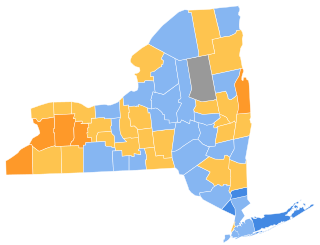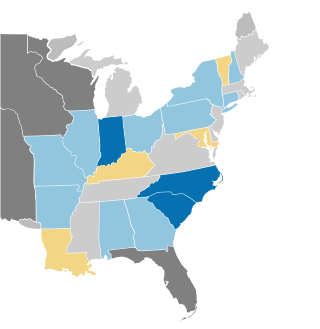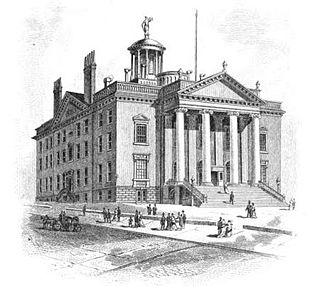| |||||||||||||||||
| |||||||||||||||||
 County Results
| |||||||||||||||||
| |||||||||||||||||
The 1842 New York gubernatorial election was held on November 8, 1842, to elect the Governor and Lieutenant Governor of New York.
| |||||||||||||||||
| |||||||||||||||||
 County Results
| |||||||||||||||||
| |||||||||||||||||
| Elections in New York State |
|---|
 |
The 1842 New York gubernatorial election was held on November 8, 1842, to elect the Governor and Lieutenant Governor of New York.
This was the first gubernatorial election in New York which was held on a single day. Until 1841, the State elections had been held during three days beginning on the first Monday in November. In 1842, the State Legislature fixed the election day permanently on the Tuesday next after the first Monday in November.
The Democratic Party nominated former Erie Canal Commissioner William C. Bouck. They nominated former state senator Daniel S. Dickinson for Lieutenant Governor.
The Whig Party nominated Lieutenant Governor Luther Bradish. They nominated state senator Gabriel Furman for Lieutenant Governor.
The Liberty Party nominated Alvan Stewart. They nominated Charles O. Shepard for Lieutenant Governor.
The Democratic ticket of Bouck and Dickinson was elected.
| Party | Candidate | Votes | % | |
|---|---|---|---|---|
| Democratic | William C. Bouck | 208,072 | 51.83% | |
| Whig | Luther Bradish | 186,091 | 46.36% | |
| Liberty | Alvan Stewart | 7,263 | 1.81% | |
| Total votes | 401,426 | 100% | ||

William Christian Bouck was an American politician from New York. He was the fifteenth Governor of New York, from 1843 to 1844.

Luther Bradish was an American lawyer and politician who served two terms as the lieutenant governor of New York from 1839 to 1842, while his Whig Party colleague, William H. Seward was governor. He was also co-founder of Children's Village.

The 1854 New York state election was held on November 7, 1854, to elect the governor, the lieutenant governor, a Canal Commissioner and an Inspector of State Prisons, as well as all members of the New York State Assembly.

The 1838 New York gubernatorial election was held from November 5 to 7, 1838, to elect the Governor of New York.

The 1840 New York gubernatorial election was held from November 2 to 4, 1840, to elect the Governor and Lieutenant Governor of New York.

The 1846 New York state election was held on November 3, 1846, to elect the governor, the lieutenant governor and two Canal Commissioners, as well as all members of the New York State Assembly and eight members of the New York State Senate.

The 1839—1840 United States Senate election in New York was held on February 5, 1839 and January 14, 1840. Incumbent Senator Nathaniel P. Tallmadge was re-elected to a second term in office over scattered opposition.

The 1843 United States Senate election in New York was held on February 7, 1843, by the New York State Legislature to elect a U.S. Senator to represent the State of New York in the United States Senate.

The 1845 United States Senate special election in New York was held on January 18, 1845 by the New York State Legislature to elect two U.S. Senators to represent the State of New York in the United States Senate. The regular 1845 United States Senate election in New York was held on February 4, 1845, to elect a U.S. Senator to represent the State of New York in the United States Senate.

The 1842–43 United States Senate elections were held on various dates in various states. As these U.S. Senate elections were prior to the ratification of the Seventeenth Amendment in 1913, senators were chosen by state legislatures. Senators were elected over a wide range of time throughout 1842 and 1843, and a seat may have been filled months late or remained vacant due to legislative deadlock. In these elections, terms were up for the senators in Class 3.

The 61st New York State Legislature, consisting of the New York State Senate and the New York State Assembly, met from January 2 to April 18, 1838, during the sixth year of William L. Marcy's governorship, in Albany.

The 62nd New York State Legislature, consisting of the New York State Senate and the New York State Assembly, met from January 1 to May 7, 1839, during the first year of William H. Seward's governorship, in Albany.

The 63rd New York State Legislature, consisting of the New York State Senate and the New York State Assembly, met from January 7 to May 14, 1840, during the second year of William H. Seward's governorship, in Albany.

The 64th New York State Legislature, consisting of the New York State Senate and the New York State Assembly, met from January 5 to May 25, 1841, during the third year of William H. Seward's governorship, in Albany.

The 65th New York State Legislature, consisting of the New York State Senate and the New York State Assembly, met from January 4 to September 7, 1842, during the fourth year of William H. Seward's governorship, in Albany.

The 66th New York State Legislature, consisting of the New York State Senate and the New York State Assembly, met from January 3 to April 18, 1843, during the first year of William C. Bouck's governorship, in Albany.

The 67th New York State Legislature, consisting of the New York State Senate and the New York State Assembly, met from January 2 to May 7, 1844, during the second year of William C. Bouck's governorship, in Albany.

The 68th New York State Legislature, consisting of the New York State Senate and the New York State Assembly, met from January 7 to May 14, 1845, during the first year of Silas Wright's governorship, in Albany.

The 1844 New York gubernatorial election was held on November 5, 1844. Incumbent Governor William C. Bouck lost his bid for nomination to U.S. Senator Silas Wright. In the general election, Wright defeated former U.S. Representative and future President of the United States Millard Fillmore.

The 1842 Massachusetts gubernatorial election consisted of an initial popular election held on November 14, 1842 that was followed by a legislative vote held on January 17, 1843. The ultimate task of electing the governor had been placed before the Massachusetts General Court because no candidate received the majority of the vote that was constitutionally required for a candidate to be elected through the popular election. Incumbent Whig Governor John Davis was defeated by Democratic nominee and former Governor Marcus Morton.